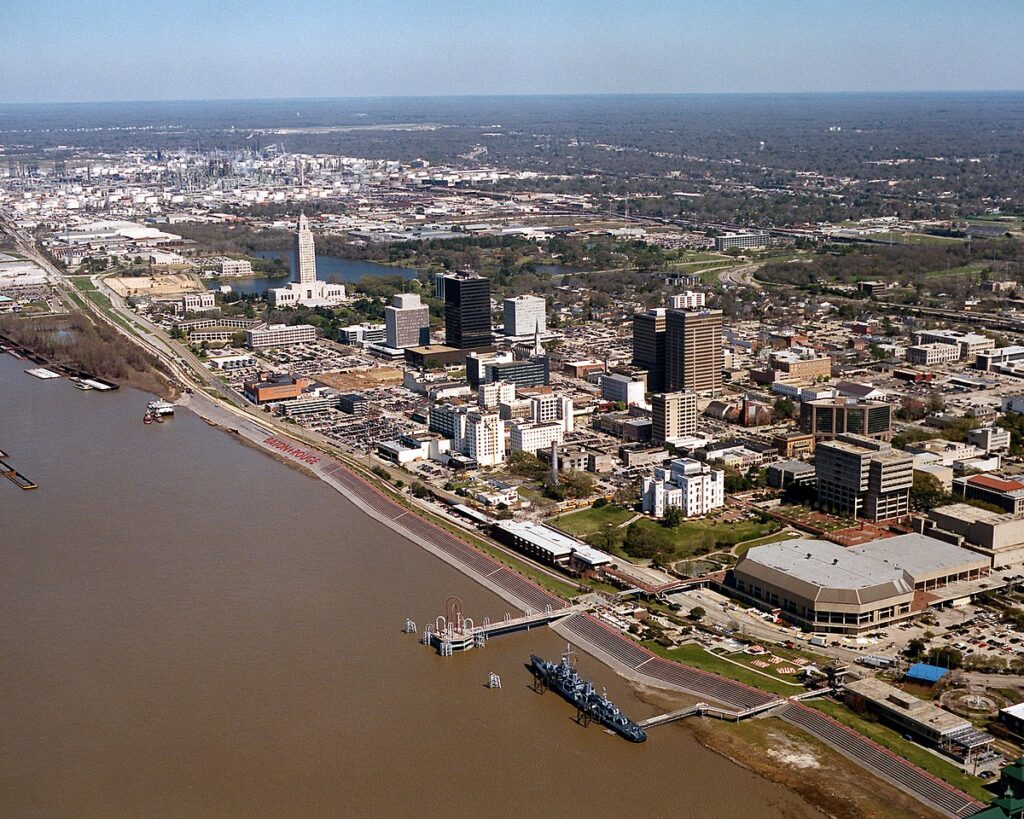
Moving to Baton Rouge, Louisiana: A Comprehensive Relocation Guide
Considering moving to Baton Rouge, Louisiana? This vibrant state capital offers petrochemical employment, LSU Tigers passion, and Louisiana culture. With approximately 227,000 residents in 2025 (metro 870,000+), Baton Rouge combines political significance with big-city amenities and the Pelican State’s capital character.
Demographic Profile to Consider If Moving to Baton Rouge:
Baton Rouge’s 2025 population is approximately 227,000 residents, making it Louisiana’s second-largest city and state capital, with the metro exceeding 870,000 in East Baton Rouge Parish and surrounding areas. The median age is around 33 years, with diverse families, LSU students and employees, petrochemical workers, and professionals. The population is approximately 54% Black or African American, 39% White, 4% Hispanic, 3% Asian. Baton Rouge features Louisiana State University campus dominating the community, petrochemical industry presence, Mississippi River location, state capitol complex, and serves as the political and educational center. The city attracts diverse professionals, LSU employees and students, petrochemical workers, state government employees, and those seeking Louisiana capital living. Baton Rouge appeals to those valuing LSU Tigers athletics, petrochemical employment, state government jobs, and diverse Louisiana culture. The community balances LSU dominance with petrochemical economy and state capital status. Find trusted local services for moving, living, and working in Baton Rouge.Baton Rouge Relocation Directory
Cost of Living to Consider If Moving to Baton Rouge:
Baton Rouge offers competitive affordability for a state capital. Median home values range from $200,000 to $300,000 in 2025, varying dramatically by neighborhood from affordable to upscale areas, providing value for capital city living. The median household income is approximately $53,000. Rental properties average $1,000 to $1,500 monthly, with abundant student housing. Louisiana has no state income tax on military retirement pay; individual income tax is progressive 1.85%-4.25%. Property taxes are very low. Overall cost of living is competitive for the career opportunities and amenities, making Baton Rouge attractive for petrochemical workers, LSU employees, state government workers, and those seeking Louisiana capital affordability. The city provides value with petrochemical industry high wages and LSU employment. Housing costs create accessibility though some flood-prone areas require insurance consideration.
Economy and Job Market:
Baton Rouge’s economy revolves around petrochemical industry, state government, LSU, and healthcare. Major employers include ExxonMobil Baton Rouge Refinery (massive complex), Dow Chemical, BASF, Louisiana State University (major employer with faculty, staff, hospitals), State of Louisiana government, Our Lady of the Lake Regional Medical Center, Baton Rouge General Medical Center, and Port of Greater Baton Rouge. The petrochemical corridor provides high-wage employment. State government employs thousands. Healthcare serves the region. Typical industries include petrochemical/refining, government, education, healthcare, and port operations. The economy depends significantly on oil and gas prices affecting petrochemical sector. Petrochemical jobs offer excellent wages. The job market attracts chemical engineers, refinery workers, state employees, and healthcare professionals.
Education:
East Baton Rouge Parish School System serves city students with numerous high schools. School quality varies dramatically by neighborhood requiring extensive research with some excellent magnet schools and others struggling. Louisiana State University is a major research university, flagship state institution, and SEC powerhouse offering comprehensive programs with nationally-ranked programs and legendary football creating massive community identity. Southern University (HBCU) provides education. The concentration of higher education creates college atmosphere. The educational infrastructure serves the large, diverse population with quality varying significantly.
Recreation and Lifestyle:
Baton Rouge offers LSU Tigers athletics creating massive community passion with football at Tiger Stadium (Death Valley, 102,000+ capacity) providing legendary Saturday night experiences and basketball at Pete Maravich Assembly Center. The city features Louisiana State Capitol (tallest state capitol building), USS Kidd naval museum, Louisiana Art & Science Museum, and historic districts. Residents enjoy Mississippi River location with levee trails, diverse dining with exceptional Cajun and Creole cuisine, growing downtown entertainment district, and Perkins Rood dining corridor. The lifestyle emphasizes LSU Tigers obsession (football dominates fall), Louisiana cuisine and culture, petrochemical employment providing good wages, and state capital character. The humid subtropical climate features hot, humid summers and mild winters. The community fiercely values LSU Tigers (football creates religious fervor), Louisiana food culture, petrochemical industry, state government employment, and Mississippi River heritage. Living in Baton Rouge means embracing LSU Tigers football obsession (fall revolves around LSU), accepting industrial character and petrochemical presence, significant neighborhood variation requiring research, flood risks in some areas requiring insurance, humid climate, and prioritizing Tigers athletics and Louisiana culture while enjoying Death Valley creating legendary game day atmosphere, exceptional Louisiana cuisine, petrochemical jobs providing high wages, competitive affordability for capital amenities, and diverse Louisiana culture defining the state capital where LSU Tigers passion meets petrochemical industry and Cajun cuisine creates the Pelican State’s most dynamic capital city.
Healthcare and Services:
Baton Rouge residents access comprehensive healthcare through Our Lady of the Lake Regional Medical Center, Baton Rouge General Medical Center, Louisiana State University hospitals including Our Lady of the Lake Children’s Hospital, and extensive facilities. The concentration of hospitals creates quality medical care with LSU medical education.
Transportation:
Baton Rouge is accessed via Interstate 10, Interstate 12, Interstate 110, U.S. Route 61, and various corridors. Baton Rouge Metropolitan Airport provides commercial service. Capital Area Transit System (CATS) operates bus service. Most residents use personal vehicles. Some neighborhoods offer walkability. Typical commute times within the metro are 20-40 minutes. Travel to New Orleans is 1-1.5 hours.
Conclusion:
Moving to Baton Rouge in 2025 offers vibrant capital city living with LSU Tigers passion, petrochemical employment, and Louisiana culture. The city’s combination of Death Valley football atmosphere, high-wage petrochemical jobs, and exceptional Cajun cuisine makes it ideal for LSU fans, petrochemical workers, state employees, and those seeking Louisiana’s capital where Tigers football meets refinery wages and Louisiana food culture defines the Pelican State’s most passionate and culturally rich capital destination.

